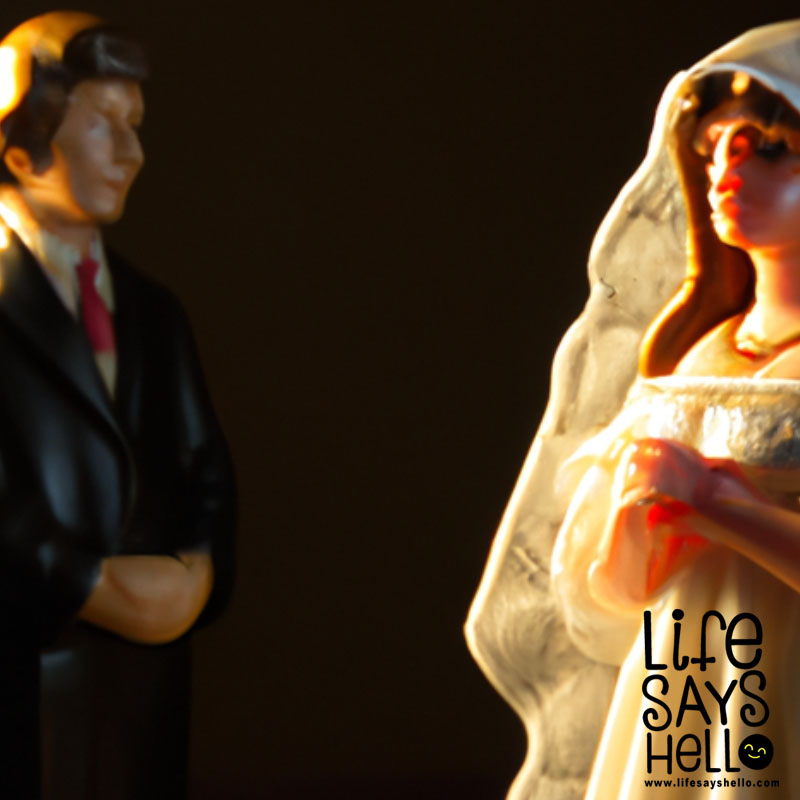The Sacred Bond of Marriage: Understanding "What God Has Put Together"

Marriage is one of the most important relationships in most people's lives. When you stand at the altar and say your vows, you are entering into a sacred bond - one that should not be broken lightly. This profound union between two people is reflected in the popular phrase "what God has put together." But what are the origins and full meaning behind this phrase? In this article, we'll explore the history and significance of "what God has put together" to gain a deeper understanding of the spiritual dimensions of marriage.
What Does "What God Has Put Together" Mean?
At its core, "what God has put together" refers to the sanctity of marriage. It speaks to the belief that marriage is a holy institution created by God, not just a human construct. The phrase emphasizes that the marital union is bigger than the two individuals involved. It is something sacred that should be honored and protected.
The saying comes directly from words of Jesus in the New Testament of the Bible. In Matthew 19:6, Jesus says, "So they are no longer two, but one flesh. Therefore what God has joined together, let no one separate." This verse occurs right after Jesus answers a question about whether divorce is allowed. By stating that humans should not separate what God has joined together, Jesus establishes marriage as a permanent bond.
The same phrase appears again in Mark 10:9, where Jesus says, "Therefore what God has joined together, let no one separate." Here too it occurs in the context of a discussion about divorce. Jesus uses the words to reinforce the seriousness of the marriage commitment.
So in summary, "what God has put together" means that marriage is a holy union created by God. It is not simply a human institution. Therefore, people should not seek to tear apart the marital bond because it has divine origins.
History and Context of the Phrase
To really grasp what Jesus meant when he spoke about "what God has put together," it helps to understand marriage practices in Biblical times. In the Old Testament period, divorce was relatively common and easy for men to obtain. But by Jesus's time in the 1st century AD, some Jewish teachers preached the sanctity of marriage and only permitted divorce in extreme circumstances.
Others still argued divorce was acceptable for minor reasons. This was the context for the questioning about divorce that prompted Jesus to talk about "what God has put together." His words come down firmly on the side of marriage as an unbreakable covenant. By saying that humans should not separate what God joined, Jesus rejected the casual attitudes some held toward divorce.
Christian thinkers have elaborated on Jesus's words over the centuries. The Church has consistently taught that marriage is holy. Early Christian theologians saw marriage as a sacred reflection of the union between Christ and the Church. The marital bond was also seen as a living symbol of God's love.
So the phrase "what God has put together" fits squarely within the long Christian tradition of upholding marriage as something sacred. Jesus's words serve as the Biblical foundation for this view. The saying continues to shape Christian thought on marriage to the present day.
The Modern Relevance of "What God Has Put Together"
While divorce rates have risen in Western countries over the last 50 years, the phrase "what God has put together" remains common at Christian marriage ceremonies. Many couples choose to include the words in their service to emphasize the sacred dimensions of the marital commitment. The phrase serves as a public proclamation that the couple intends to form a lifelong union before God.
For religious couples, "what God has put together" powerfully reinforces that marriage is bigger than just the two individuals involved. It is a spiritual journey partners embark on together. The phrase reminds spouses that their relationship has a divine element and purpose behind it. This gives theological meaning to the ups and downs of married life. It inspires couples to stick together when times get tough.
"What God has put together" also communicates that couples should nurture a shared faith to sustain their bond. Their union is not just physical and emotional, but spiritual too. They must keep God at the center of their relationship. By invoking the phrase, newlyweds acknowledge that their marriage is about more than just themselves - it is a sacred trust.
Tips for Upholding "What God Has Put Together"
For couples who take their marriage vows seriously, "what God has put together" sets the tone for their entire married life. Here are some tips for making this ideal a reality:
Pray together regularly: Couples who wish to honor the sacred dimensions of marriage should pray together often. Lifting up your relationship to God invites His presence into your union.
Seek spiritual counsel when needed: Sometimes couples benefit from meeting with a pastor, priest or other spiritual mentor.
Participate in church together: Attending services and being part of a faith community helps keep your relationship centered spiritually. It also provides a supportive environment for your marriage.
Read spiritual texts together: Studying passages from the Bible, inspirational books, or other religious works fosters shared spiritual growth. It gives couples tools to overcome challenges.
Serve others: Volunteer work, charitable giving, and other service activities allow couples to live their faith together. It helps them look beyond themselves and their own needs.
Seek enrichment: Retreats, workshops, or seminars geared towards married couples can provide renewal. They offer insights from faith perspectives on strengthening your bond.
Reflect on your vows: Rereading or thoughtfully reminiscing about the commitments you made reminds spouses to cherish the sacred gift of marriage. It taps them into the deeper meaning of their union.
Let go of petty grievances: Focusing too much on minor annoyances can corrode marriages built on lofty spiritual ideals. Couples must let go of smaller offenses to preserve the sanctity of their bond.
Practice unconditional love: The commitment to love one another unselfishly and unceasingly, regardless of flaws or circumstances, is key to honoring the divine nature of marriage.
By integrating their faith into their marriage and making their relationship a spiritual journey, couples can fulfill the timeless ideal of "what God has put together." Their union takes on transcendent meaning when God remains at the center, binding and blessing their lives together.




Comments